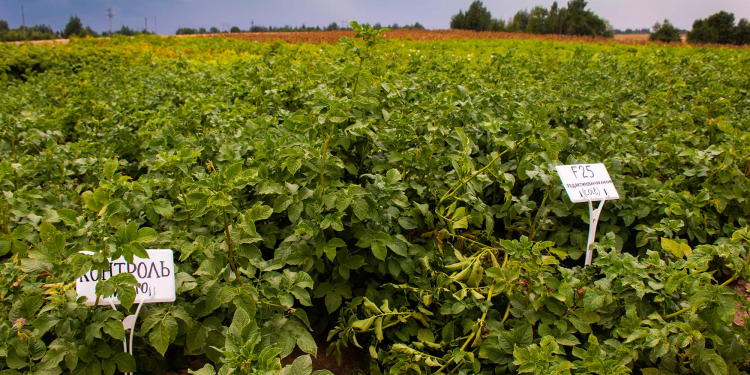Agronomic improvement comes first, followed by nutritional enhancement and biotic stress resistance as traits of field trials. Regarding the biotech crops, potato is the most tested crop with a fifth of the field trials (20.8%). The implications of regulatory policy in the restrictive deployment of NBTs for plant improvement in Europe are discussed as well as the need for a new regulation.
The recent global climate change has directly impacted major biotic and abiotic stress factors affecting crop productivity worldwide. Therefore, the need is to develop sustainable multiple stress tolerant crops. NBTs and the modern biotechnological approaches can cope with climate change faster than conventional tools. NBTs could also be used for developing crops with novel agro-traits that can help reduce pesticide, fertilizer and water and nitrogen use and improve food quality and safety. New crop varieties combine high yield potential coupled with several genetic traits. The classification of CRISPR-type gene editing patents worldwide in plants shows an unexpected switch in the balance of forces in favour of China while providing no indication that Europe, which has lost the “GMO” battle, is in a position of regaining forces in this new biotech battlefield.
On 25 July 2018, the European Court of Justice (CJEU) ruled on the interpretation of the definition of the term “genetically modified organism” in the GMO Directive 2001/18/EC. It follows from the ruling that all organisms produced by genome editing are subject to the legal framework applicable to release, placing on the market, labelling, and traceability of GMOs. France is implementing the CJEU ruling (C-528/16) on mutagenesis procedures on June 2020. Plants resulting from in vitro mutagenesis procedures constitute GMOs and are subject to genetic engineering and environmental protection legislation. The European Commission can implement the ECJ ruling for the EU and the Council of State (Conseil d’État), French highest administrative court, must implement it for France. The French Council of State rendered its judgement on 07.02.2020. The court largely followed the CJEU ruling.
Gene editing products would seem to follow a much faster development rate from bench to market than GM products if the regulation is not too stringent. Today few plants developed with NBTs are in the market worldwide. In Europe Regulatory constraints, including environment and health impact assessments of transgenic plants, have delayed approvals and increased costs for transgenic plants (Ricroch, Boisron & Kuntz 2015). While the science is exciting and some clear benefits are already observable, overregulation and public misperceptions may obstruct efficient development and use of NBTs (Quaim 2020). Our present study shows that overregulation has slowed down innovation in Europe as very few field trials tests using CRISPR have been set up and patents deposited. The problem could be attributed to a hostile cultural (“precautionary”) climate against innovations in Europe, including biotechnology (Kuntz & Berezow 2017). It would be a delusion not to consider that the successive GMO bans in Europe have not had a strong negative impact on the future of NBTs in this continent. Following a request of the European Commission (EC), the European Food Safety Authority (EFSA) evaluated the documentation submitted by several Member States in support of their request for the prohibition of the placing on the market of the GM maize MON 810 for cultivation according to Article 18 of Directive 2002/53/EC. Hungary (in 2005), France (2008), Germany (2009), Italy and Poland (2013), Greece and Bulgaria (2014) and Northern Ireland (2015), etc. requested the EC to adopt emergency measures to prohibit the cultivation of the GM maize MON 810. In 2015 several countries such as France, Germany, Austria, Greece, Hungary, the Netherlands, Latvia, Lithuania, Luxembourg, Bulgaria, Poland, Denmark, Malta, Slovenia, Italy and Croatia have chosen a total ban while Wallonia, the French-speaking region of Belgium has opted out, as well as Scotland, Wales and Northern Ireland (according to the EU Directive 2015/412). Based on EFSA opinions, around 80 events currently have approval for import into the EU (mainly herbicide tolerance) in 2020. How the genome editing policy in Europe is obstructing the development of new traits and is negatively influencing governance decisions and trade worldwide is described by Schiemann et al. (2020). Urnov, Ronald and Caroll (2018) come to conclusions that despite the Curia decision regulatory corrections are still possible, they say: “The CJEU ruling does not explicitly ban gene-edited crops. Instead, it categorizes them with transgenic plants and subjects them to such extensive risk evaluation that the cost of gaining approval could be borne by only the largest corporations. From a scientific perspective, this is, in plain terms, nonsensical: as explained above, thousands of crops produced with radiation carry a wealth of small genetic changes and are deemed safe. Why would a crop in which just one such change has been introduced by genome editing be regulated differently?” Overregulation is particularly observed in Europe and a new regulation based on the product rather than on process is required (Ricroch, Ammann & Kuntz 2016). As plants modified by the NBTs are considered GMOs, it can be predicted that there will be fewer trials using these techniques in a near future, as was the case with transgenesis as early as 2006. The creativity of European researchers (breeders in public and private laboratories) is in danger of being hindered. This creativity could have been at the service of climate smart agriculture. Only UK, which is outside the European framework, retains the freedom to carry out research with the latest genetic and genomic tools. Europe will import agricultural products modified by transgenesis and NBTs from China and USA which are the leaders in the world.







